Sign in to create or edit a product review. 
Pathfinder Adventure Path #142: Gardens of Gallowspire (Tyrant's Grasp 4 of 6)Paizo Inc.Print Edition Unavailable Add PDF $19.99 Non-Mint Unavailable Wish I could give it a star higher!This book was very much a highlight in the Tyrant's Grasp campaign. The players finally get to see Arazni's plan come to fruition, along with experiencing firsthand the effects of the Tyrant's actions on Lastwall. Moreso than in previous entries, their actions and investment in roleplay can have an impact on some of the characters who show up. The major detraction is that - unfortunately - the following books take the players away from Lastwall so the story and ending has to all be filled in by the DM on that front, along with anything else the players might have gotten attached to. Still, it's a chance for the players to get more invested through seeing the actual impact of the campaign and a very good adventure by itself. 
Pathfinder Adventure Path #140: Eulogy for Roslar's Coffer (Tyrant's Grasp 2 of 6)Paizo Inc.Add Print Edition $24.99 Add PDF $19.99 Non-Mint Unavailable The Arazni article is incredibly rich and compelling. She is one of the standout deities for the simple amount of humanity the writers and Pathfinder staff have managed to add to her. There were a lot of needles to thread and they did an outstanding job with her. 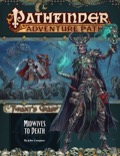
Pathfinder Adventure Path #144: Midwives to Death (Tyrant's Grasp 6 of 6)Paizo Inc.Print Edition Unavailable Add PDF $19.99 Non-Mint Unavailable Boring end to a dull campaignThis book feels like it was written for PFS, where random players/player characters who don't know each other, have little direct investment in the plot, and aren't going to face any personal consequences have shown up to fight a weekly baddie. It'd be a fine PFS book. For the climax of PF1e and the final defeat of the Whispering Tyrant, it's lacking. Like the rest of this campaign, the players are shuffled along a very specific path with no care for their options, no room for ingenuity, and complete expectation in having the most uninvested, generic party with no ties to anything beyond a vague need to fight Tar-Baphon. The book's boring. It's a pointless dungeon crawl where your players can talk to some worthless undead if they want, but why? There's zero roleplay involved and they serve no purpose. Minor spoiler:
Do not spring the other side of this ending on your players. I would murder my DM if they tried this. My own players would never play with me again. However cute you might think this to be, either tell them at the start of character creation or don't use this book. this book had some real high points, namely with the dark horse protagonist Vreva, but it ends abruptly and feels anticlimactic, without much closure. it honestly feels like there was a ton of material just chopped off to make it fit, leaving me more frustrated than satisfied. 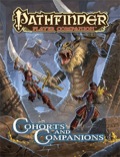
Pathfinder Player Companion: Cohorts & Companions (PFRPG)Paizo Inc.Print Edition Unavailable Add PDF $9.99 Non-Mint Unavailable A grudging three stars...This book has little to offer anyone who already gets to play at tables or settings with that allow leadership. 3.5 and third party material provide far more than what's found here and there's very little that's new or innovative. Unfortunately, a lot of it is necessary catch-up, such as providing a mechanical means of allowing a paladin to get a pegasus, or a druid to bond with a worg or winter wolf, an ability already suggested in the 3.5 core rulebook and often awarded during play, but not captured in terms of game mechanics. Also, the title is somewhat... obfuscating; "companions" in this book often refers to your fellow players as often as it does hirelings or cohorts, and much of it is devoted to what essentially amount to teamwork feats/traits/abilities. There are a couple real high points, with some very unique archetypes that stand head and shoulders above the crowd, like a wizard that takes an apprentice, and alchemist construct-mounts. The book does expand on hirelings a bit more for nature-lovers as well, adding mechanics for growing plant allies. As a whole it makes a very valiant effort to include something for almost every player or class, and like I said there are some high points. It still lags behind much of the other material out there, but it's a fair investment for a Pathfinder-only table. 
Pathfinder Tales: The Redemption EnginePaizo Inc.Print Edition Unavailable Add ePub/PDF $6.99 Non-Mint Unavailable great readWhile I really wanted to like Death's Heretic, there were just too many niggling details that made doubt James Sutter's ability to write solid characters. Any doubts I had about where he was taking Salim, the plot, and the character development have disappeared after reading the Redemption Engine. His handle on his characters has improved immensely from Death's Heretic and half the excitement from reading the "sequel" (in the sense that it continues Salim's journey) is in seeing how much tighter his characters get. Sutter continues Salim's path with more mystery, more quests for Pharasma, but this time Salim's strong, embittered opinions are countered by angels that needle him, undead that he really connects with, and friends that he comes to deeply appreciate. This book does so much to make Salim feel real and human, while still continuing Sutter's whirlwind quest to have the man visit every single plane of existence. A very exciting read and top tier in the Pathfinder Novels. A+, 5 stars, would rec to friends. 
Pathfinder Tales: Death's HereticPaizo Inc.Print Edition Unavailable Add PDF/ePub $6.99 Non-Mint Unavailable Great insight into Golarion, less into charactersAs a whole this was fairly passable, if nothing to really get excited about. There's a whirlwind of locales from Golarion that are visited and then left immediately, but like those locales, it's neither here nor there. What really drags the story down is the difficulty Sutter has with making his characters... actually like each other, I guess. On paper, they seem like they could be very interesting, but in practice they're dry, inconsistent, and I really do struggle to understand why they like each other as *people*. The main character, Salim, is an atheist that is, ironically, as sanctimonious and insufferably preachy as any paladin - to the point that he even acknowledges the size of the chip on his shoulder - and usually presents as an unwashed, surly, and disagreeable character that is constantly lecturing and/or preaching to others. Sutter's female characters are really into that, I guess, because they all take to him almost instantly. I honestly struggle to see why. Salim genuinely does not have friends, nor is there any explanation as to why the few people he does interact with like or care about him at all. The women aren't particularly better. The female love interest has "love interest" written across her young, beautiful body from the moment she's introduced as such, and there's a weird part of her character where she is willing, almost eager, to defile the corpses of the slaughtered fey whose homes she stole and burned, but then she balks at Salim harming the humans who were going to execute her. I couldn't tell if she was just really racist on purpose or if Sutter just forgot he'd written that earlier. Her romance with Salim consists of her being young and pretty and doing all the things women stereotypically do in fantasy, and him needing to save her low-level and incompetent self from the dangers she hurls herself into. For me, it just wasn't particularly compelling. As a whole, the story was good enough to keep reading, but I still struggle with trying to decide if the characters were meant to be the flawed and broken people portrayed in the book, or if it was just an inability to convey the depth of their relationships on the part of the author. If you're someone who enjoys characters interacting with each other, I'd give this one a pass. It's a great primer on planar travel in Golarion, not so great for the character development. -edit- I want to clarify that Sutter is extremely talented and there is a LOT of potential with this book. The fact that he was able to coherently thread together visiting a half-dozen Golarion planes as part of the main story speaks volume of his ability as a writer. The real problem is that while his world-building is honed to its finest point, his character building is lackluster at best (and Salim's relationship with the female love interest is more than half the plot of this book). If his characters were simpler, it might work, but Sutter has a number of diametrically opposed bullet points for Salim and his love interest. Salim is a century-old, planeswalking bounty-hunter for a powerful goddess that grants him some spectacular abilities, yet none in her church - or even the churches of any other god - know of him. He's a "grizzled and hard-bitten" old man, but is physically and emotionally a wounded young man. There are times that his boyishness and youth actually do show through and he seems to come alive, but they are rare and usually completely glossed over. Despite his surly attitude, preachiness, and sour disposition towards everything, he's apparently diplomatically skilled and suited to interpersonal conversation. There's just too many opposites shoved into one character! The love interest is no different, being a belligerent and sheltered young woman who moved to the city 3 years ago, but also has learned the language, built an enormous mansion, and settled down as if she'd lived there 10 years. She ends up not having much character at all, unfortunately, and Sutter does little to reconcile their internal differences. It's totally possible for the two of them to have had a rich relationship where the emotionally-wounded Salim is taught that he is not nearly as mature as he thinks by his young-but-potentially-wiser-than-him lover; Sutter has it in him to do that, he just needs to exercise the character-building side of his writing a little more. 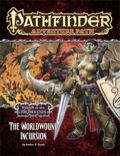
Pathfinder Adventure Path #73: The Worldwound Incursion (Wrath of the Righteous 1 of 6) (PFRPG)Paizo Inc.Print Edition Unavailable Add PDF $19.99 Non-Mint Unavailable An astoundingly good adventureThis book is one of the funnest 1-6 adventures that Paizo has put out there. Amber Scott is a fantastic writer who created some fun encounters that actually fit with the pacing and the story. The path opens with a bang AND ends with one too. Even if you don't play any of the other Worldwound adventures, play this one - you won't regret it. Ssalarn nicely summed up the mechanics of it: I'll talk flavor. The gender restriction/eunuch stuff is mostly fluff. It's totally easy to ignore if it doesn't float your boat, and I recommend you get over it because this alternate class is so pumped full of clever flavor that I salivate just thinking about it. There are essentially two options available (pegasus or unicorn), and both are bomb - particularly at low-level. For those campaigns that might not get far, this allows your paladin to truly stand out. The level 1 start with a magical mount can make for unusual and refreshing takes on the ol' stalwart paladin. In some ways, the added emphasis on the mount makes this class stray into cavalier territory, and trust me, if you're going for a mount that early, you're not gonna want to let your character get separated from it. I can imagine many DMs frowning at getting the magical mount so early, but it's not the full creature (it advances at certain points), and on top of that the paladin gives up some major, significant abilities in order to get there. In the end, however, it's really no different to have a level 7 paladin with an optional-variant unicorn mount AND full Lay on Hands progression when compared with a level 7 forsworn and Bard-progression of a few druid spells. The forsworn pally just had a funner time getting there. 4/5 stars, great for low levels, new takes on an old class, and stunning for the low price of free. excellent material. 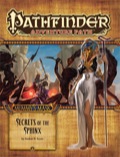
Pathfinder Adventure Path #82: Secrets of the Sphinx (Mummy’s Mask 4 of 6) (PFRPG)Paizo Inc.Print Edition Unavailable Add PDF $19.99 Non-Mint Unavailable Solid addition to the Mummy's Mask - or any campaignAmber Scott did an excellent job with this adventure, managing to seamlessly blend a mix of fighting, rping, and skill checks all into one big encounter. It comes at a perfect time in the campaign, allowing for a triumphant return to dungeoneering and monster-fighting action, if your players have tired of doing research and pleasing their patron in the last book. Alternatively, if you have a bunch of diplomancers and skill monkeys, there are a number of just brilliant ways to allow them to continue to shine. There is no one set path through this installment, and there are even a couple of short, but satisfying "what happened next" stories for the effects of possible actions the PCs might take. It really is impressive how perfectly this fits with the rest of the campaign thus far; it feels tied in, the things that happen are exactly what players are looking forward to, and the very well-thought-out paths through the dungeon genuinely fit the interests any group of players might have. It's not a stunning or revolutionary book, but it doesn't need to be. It's got a compelling story, unusual creatures that don't often get explored, and fun combat. Rock-solid book, I'd recommend it even for use outside of the entire Mummy's Mask AP. 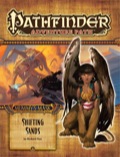
Pathfinder Adventure Path #81: Shifting Sands (Mummy’s Mask 3 of 6) (PFRPG)Paizo Inc.
Add
Print Edition
Add PDF $19.99 Non-Mint Unavailable Bland, save for a couple highlightsLike the first two in this AP, there's not really anything to write home about, although this book does have some really cool moments where the PCs are challenged to do a number of RP-heavy skill-checks. The skill-checks are pretty novel and can be rather entertaining, and are foisted on the PCs by a very novel and amusing not-quite-villain NPC. In many ways, this is the great team-building event that should have occurred at the start of the AP, rather than so far down the road. The book seems to remember to add some combat at the end and shoves a little lair battle in before it's over, returning to the remarkably dull search for the Forgotten Pharaoh, but overall, when paired with some great DMing, a lot of memorable moments can be snagged from this one. 
Pathfinder Adventure Path #78: City of Locusts (Wrath of the Righteous 6 of 6) (PFRPG)Paizo Inc.Print Edition Out of print Add PDF $19.99 Non-Mint Unavailable Don't waste your time (or that of your players)I loved this Adventure Path. From the first book, I was hooked. That's why I find it so disappointing that it sputters out with the most boring, impossibly un-epic finale like this. Let me save you curious folk some time: The players faff about in a brothel that's too low-level for them. Then they go to a tower and solve a mystery literally every single one of them should have already figured out, find a magical macguffin, fight ANOTHER succubus queen (as if the last four weren't enough) and then... don't even fight Deskari. Worldwound closes, peace and eternity I guess, Queen Galfrey, like, retires?? Just steps aside so a real man can do the job a lady couldn't handle or something. Meanwhile, Deskari derps around in a pocket dimension. Too bad fighting him was "beyond the scope of the path"! You know what I - and especially my players - would have rather done than go to a wildly out of place succubus brothel? Fight Deskari. That would have saved you some precious page room, Paizo. And gah, that brothel! WHY? A brothel out in the ruined wastelands that supposedly caters to "only the most elite of the elite" and "has something for everyone, even the rarest taste" - except it has 5 chicks, with 1 disguised as a dude I guess. Really? I mean, Paizo is really progressive in a lot of ways, but there's starting to be a clear, sorta creepy hang-up about having anything sexual being exclusively portrayed by women (roughly a ratio of 99% at this rate). I dunno, I just find it really, really, really hard to believe that anyone at level 15+ could give a single fig about this brothel, much less two. And it's out of place, so much so that the whole pace ground to a halt and people in my play group had to constantly ask me what they were supposed to do, why were they there, why weren't they out doing more productive things? They were too powerful for any of the brothel encounters so they weren't afraid of fighting, and too good to be inclined to consort - at all - with some clearly, CLEARLY evil demons. I'm so mad, because if this had been in Midnight Isles, it would have still been a remarkably lame, tame, and boring brothel, one you could take your grandmother to it's so conventional (hardly fitting for "the exclusive delight" of the entire Deskari host), but it would have made sense. Well, at least, more sense than popping up and grinding the entire campaign to a halt. Then some other encounters happen, nothing noteworthy or meaningful, then you fight Arelash or whatever and she's basically the exact clone of any succubus boss ever (one you may have fought twice already, if your players - like mine did - angered Nocticula). Then that's it. The macguffin saves the day, your players don't even need to solve a single puzzle, the end. It's remarkable how unsatisfying an ending this book is to a campaign. tl:dr - Even if you bought every other book in the campaign, don't buy this. You can use random monster generators to make better encounters and there is nothing at all that matters in this book. 
Pathfinder Tales: Stalking the BeastPaizo Inc.Print Edition Unavailable Add ePub/PDF $6.99 Non-Mint Unavailable Decent story, interesting readI was very mixed on what to rate this book. The characters that Jones chose to follow were WAY cool. They each felt unique, they each felt interesting, and they weren't your stereotypical fantasy cliches. They were fun, original, and carried the story. It's what happens in the story that I struggle with. A LOT of people die, both in the adventuring party and in the story world. I mean, a LOT of people, total body count probably in the high hundreds, if not hitting a thousand, in a place in the world that isn't exactly highly populated. What they accomplished should have made them nearly legendary - made everyone who participated in the hunt legendary - and yet the book just sort of ends with them getting a 500gp reward which, granted, the author takes some liberties with and has 500gp be a very significant amount of money, but at the same time... this was such a wildly significant task they accomplished. Any of these characters should be a legend in the River Kingdoms, and yet they just sort of retire to anonymity I guess? I mean, it's fine that the author wants to have death not hold too much significance and I respect his right to change some mechanics (or have some classes do normally impossible things), because hey, it's a story and he's the DM. That's perfectly cool. It really fleshed things out and added a lot in most cases! However, it ends up feeling like the adventurers more or less just bungle their way through the campaign, dying left and right and not really accomplishing much. It conveys the idea that the main characters could have gone on the adventure alone and saved everyone else the time and pointlessness of all these other introductions. 
Pathfinder Tales: King of ChaosPaizo Inc.Print Edition Unavailable Add ePub/PDF $6.99 Non-Mint Unavailable Not as good this time aroundI went out on a limb and got Queen of Thorns a few months ago, not expecting much, and was blown away by how tight Gross's writing is. The characters felt like they actually LIKED each other, the mechanics made sense, and the party felt actually competent, rather than the usual bunglers that only make it to the end of the book by virtue of the fact that they were simply the ones that didn't die. King of Chaos, simply put, isn't as good as Queen of Thorns. I think it's a testament to Gross's writing that his characters still felt like they actually cared for and liked each other, but everything else feels like it was just slapped together and given the go-ahead. Like another review mentioned, the conclusion is pretty anticlimactic, with numerous loose ends all getting tied up in just a few pages, the party itself generally fails every dice roll, spot check, and the body count soars in an unfortunately meaningless way. For instance, the book ends on a hopeful note that the survivors might rescue one remaining companion; that would be great, if like eighteen other people hadn't gotten offed so quickly that I was actually able to form some sort of attachment to any of them, much less the captured adventurer. Even the mechanics fall way short; at one point, a sorceress who at the start of the book says she casts wind and ice spells later on claims she's useless for the task because she casts fire and sand spells. She leveled and traded all her old spells away without saying anything I guess? I don't know, it just felt sloppy. I like Gross's characters, I love what he does to flesh out the world, and I respect his ability to tell a great story. This one just doesn't measure up to what he's done before, I'm afraid. |





